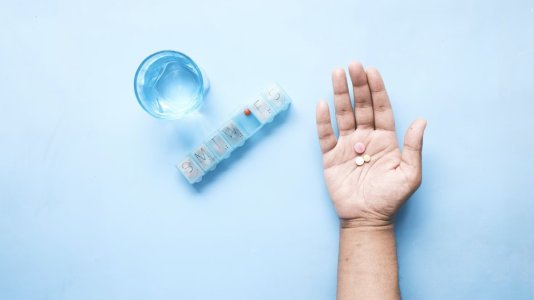A 30-year wait ends: New antibiotic offers relief for millions struggling with UTIs
- Replies 0
Disclaimer: The information provided in this article is for educational purposes only and is not intended as a substitute for professional medical advice, diagnosis, or treatment. Always consult your physician or other qualified healthcare providers with any questions you may have regarding a medical condition or before making any changes to your health regimen.
Millions of women know this discomfort all too well—an all-consuming urge, a burning sensation, and recurring symptoms that return no matter how many times they’ve been treated.
For decades, the go-to remedies have stayed the same. But as the problem grew worse, options became less effective.
Now, after 30 years of waiting, a breakthrough is offering relief many never thought would come—and experts say this could be a game-changer for one of the most widespread and stubborn health issues in the country.
Uncomplicated urinary tract infections, or UTIs, impact up to 16 million women in the US each year. More than half of all women will experience at least one in their lifetime.
And for nearly half of those affected, the infection comes back within just a few months. These infections aren’t just uncomfortable—they’re becoming harder to treat.
A rising number of UTIs are now antibiotic-resistant, meaning the usual medications are no longer as effective.

Studies show that 92% of bacteria responsible for UTIs are resistant to at least one antibiotic, and nearly 80% don’t respond to at least two.
“Not only are these infections painful and unpleasant, they are becoming more difficult to treat,” said Dr. Cynthia DeTata, ob-gyn at Stanford Medicine Children’s Health.
She explained that one major reason for resistance is when people don’t finish their full course of antibiotics.
“Partially treating an infection allows rebound growth of bacteria that are now resistant to that antibiotic,” she said.
Also read: Stop eating this now: The shocking food behind America's UTI epidemic!
But doctors now have something new in their toolkits. In March 2025, the Food and Drug Administration (FDA) approved a medication called gepotidacin, sold under the brand name Blujepa, to treat uncomplicated UTIs.
It’s part of a brand-new class of antibiotics—the first of its kind in decades. “Gepotidacin is part of a new class of antibiotics called triazaacenaphthylenes,” Dr. DeTata explained.
“This class is so new that currently, gepotidacin is the only one in it.”
Unlike older drugs that target bacteria cell walls or proteins, this one targets enzymes known as topoisomerases, causing breaks in bacterial DNA and killing them off directly.
That makes gepotidacin a bactericidal antibiotic—it kills, rather than just slows, the bacteria.
Side effects seen in trials were manageable: 16% of participants experienced diarrhea and 9% had nausea, both common with antibiotics.
The drug performed as well—or better—than nitrofurantoin, a current frontline treatment for UTIs. And it might be useful beyond just UTIs.
Dr. DeTata noted that gepotidacin “has the potential to be used for the treatment of gonorrhea, which has also been difficult to treat due to multi-antibiotic resistance.”
While other drugs like Pivya and Orlynvah were approved in 2024, they belong to existing antibiotic families.
Also read: The infection everyone should take seriously: How a common UTI changed one woman’s life forever
That makes gepotidacin uniquely positioned to help address resistance in a new way.
“The last time a new antibiotic was approved for an uncomplicated UTI was 30 years ago,” said Dr. Gil Weiss, an ob-gyn and professor at Northwestern Memorial Hospital.
“Our treatments have remained unchanged, while bacteria have continued to evolve.” That’s why this new option has experts optimistic.
“I’m very excited that a new medication has come to market,” Weiss said. “Any new medication for something so common is a win-win situation.”
Read next: The first new antibiotic in years has been approved—what it means for you

What do you think about this new treatment option? Have you experienced recurring UTIs or antibiotic resistance? Let us know in the comments!
Millions of women know this discomfort all too well—an all-consuming urge, a burning sensation, and recurring symptoms that return no matter how many times they’ve been treated.
For decades, the go-to remedies have stayed the same. But as the problem grew worse, options became less effective.
Now, after 30 years of waiting, a breakthrough is offering relief many never thought would come—and experts say this could be a game-changer for one of the most widespread and stubborn health issues in the country.
Uncomplicated urinary tract infections, or UTIs, impact up to 16 million women in the US each year. More than half of all women will experience at least one in their lifetime.
And for nearly half of those affected, the infection comes back within just a few months. These infections aren’t just uncomfortable—they’re becoming harder to treat.
A rising number of UTIs are now antibiotic-resistant, meaning the usual medications are no longer as effective.

A long wait is finally over as a new option helps people with UTIs. Image Source: Towfiqu Barbhuiya / Unsplash
Studies show that 92% of bacteria responsible for UTIs are resistant to at least one antibiotic, and nearly 80% don’t respond to at least two.
“Not only are these infections painful and unpleasant, they are becoming more difficult to treat,” said Dr. Cynthia DeTata, ob-gyn at Stanford Medicine Children’s Health.
She explained that one major reason for resistance is when people don’t finish their full course of antibiotics.
“Partially treating an infection allows rebound growth of bacteria that are now resistant to that antibiotic,” she said.
Also read: Stop eating this now: The shocking food behind America's UTI epidemic!
But doctors now have something new in their toolkits. In March 2025, the Food and Drug Administration (FDA) approved a medication called gepotidacin, sold under the brand name Blujepa, to treat uncomplicated UTIs.
It’s part of a brand-new class of antibiotics—the first of its kind in decades. “Gepotidacin is part of a new class of antibiotics called triazaacenaphthylenes,” Dr. DeTata explained.
“This class is so new that currently, gepotidacin is the only one in it.”
Unlike older drugs that target bacteria cell walls or proteins, this one targets enzymes known as topoisomerases, causing breaks in bacterial DNA and killing them off directly.
That makes gepotidacin a bactericidal antibiotic—it kills, rather than just slows, the bacteria.
Side effects seen in trials were manageable: 16% of participants experienced diarrhea and 9% had nausea, both common with antibiotics.
The drug performed as well—or better—than nitrofurantoin, a current frontline treatment for UTIs. And it might be useful beyond just UTIs.
Dr. DeTata noted that gepotidacin “has the potential to be used for the treatment of gonorrhea, which has also been difficult to treat due to multi-antibiotic resistance.”
While other drugs like Pivya and Orlynvah were approved in 2024, they belong to existing antibiotic families.
Also read: The infection everyone should take seriously: How a common UTI changed one woman’s life forever
That makes gepotidacin uniquely positioned to help address resistance in a new way.
“The last time a new antibiotic was approved for an uncomplicated UTI was 30 years ago,” said Dr. Gil Weiss, an ob-gyn and professor at Northwestern Memorial Hospital.
“Our treatments have remained unchanged, while bacteria have continued to evolve.” That’s why this new option has experts optimistic.
“I’m very excited that a new medication has come to market,” Weiss said. “Any new medication for something so common is a win-win situation.”
Read next: The first new antibiotic in years has been approved—what it means for you
Key Takeaways
- UTIs affect up to 16 million women in the US annually, and almost half experience repeat infections.
- The newly approved drug gepotidacin (Blujepa) is part of a completely new class of antibiotics, the first since the 1990s.
- It kills bacteria by breaking their DNA strands, offering a new way to fight resistant infections.
- Doctors say gepotidacin may also be useful for treating antibiotic-resistant gonorrhea.






